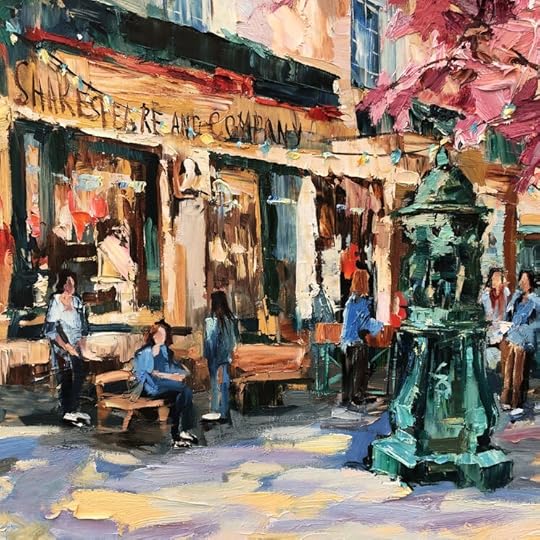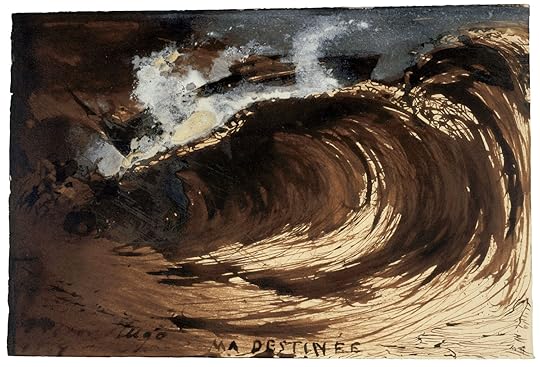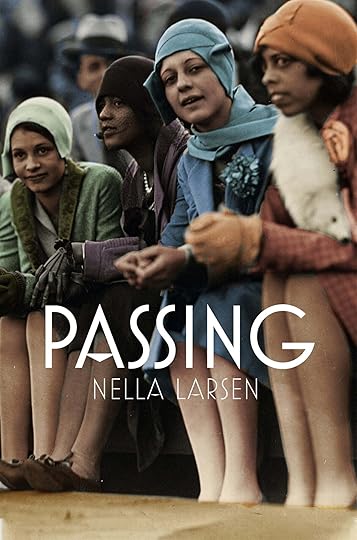2025 Reading Challenge discussion
ARCHIVE 2023
>
William's Café
date newest »
newest »
 newest »
newest »
message 1:
by
William
(last edited Mar 19, 2023 08:50AM)
(new)
Mar 13, 2023 03:33PM
 William's Café
William's Café



reply
|
flag
 I love the vibes, William.
I love the vibes, William. I'd definitely recommend checking out how other members do it - there's plenty of inspiration to gather. Maybe you won't need both spaces. Some members don't. However, most use their corners to keep track of challenges, and their reading challenge thread for book reviews. Do whatever works for you :)
You're welcome to check out my Personal Challenge - here and my Corner - here , if you'd like.


Yesterday, I finished The Man Who Laughs , by Victor Hugo (1869).
This was one of Hugo's later books, published seven years after Les Miserables (1862), and sixteen years before Hugo's death in 1885. It is also of note, that Hugo wrote The Man Who Laughs, as well as Les Miserables and other notable works, while in exile. Although I do not know much about that portion of his life. More importantly, this story is not what readers expect when they think of Hugo. I.E. It is not Les Miserables. Do some research on Hugo's paintings/drawings. That will give you a good sense of this book's tone...
I wanted to give Hugo another chance after reading Les Miserables. Another chance, because the core story of Les Miserables is, of course, outstanding. But there are at least three HUGE sections of mind-numbing and tedious reading about the Battle of Waterloo or the sewers of Paris or the people who were elite in France in the 1830s. It is just too much. I wanted to read another work by Hugo to see if this is just an aberration or if his inclusion of long old-timey historian passages is "Hugo."
Turns out, it is "Hugo." The Man Who Laughs once again involves an incredibly visceral story that condemns elites, royalty, and poverty. The story's main characters and the message that Hugo wants to impress upon readers is easily accessible and memorable. However, the story itself comprises perhaps half of the entire book. I listened to this as an audiobook. The storyline began right away for about 1.5 hours. Between hour 1.5 and hour 8, the book largely comprised histories of English royalty and how the entire government is set up. Pretty dry stuff. By hour 8.5, I told myself, "I am going to give this book one more shot. If we don't get to something relevant, I'm dropping it." Lo' and behold, at 9 hours and 15 minutes, the books shifts back to the narrative that began at hour 1 and went into hiding for 7 or 8 hours after.
After I finished the book, I thought to myself, "damn you, Hugo." He got me! The book had some twists, some drama, some romance, and, most importantly for me, a political message that applies to our present situations. It is incredible how timeless Hugo's books can be. Their timelessness is also rather sad.
Should you read it? Yes.
Should you consult someone else who has already read it to see what parts you can skip? Also, yes.
Hugo is always going to Hugo.
P.S. Yes, I will probably read more Hugo...


Anna Karenin
Unlike Hugo's, The Man Who Laughs, I am not listening to Anna Karenina on audiobook. I am reading a physical copy of this book. So this is going to take me a while.
And unlike Hugo, Tolstoy shows that one can write a page-turner tome of a book. Yes, Anna Karenina is over 800 pages long. But it is broken up into 2-4 page sub-chapters that make for easy picking up and putting down. Sub-chapters over 7 pages long are rather rare, so far.
As of 03/19/2023 (169 pages in), I am really enjoying the book and highly recommend it!
03/22/23: Huge plot twist yesterday....the story just keeps giving!
04/01/23: Reached Part Four – about 45% of the way through the book. The plot twist may be being dragged out a bit. But this seems in part due to Tolstoy following two or three major characters in-depth at the same time. The story bounces around from Moscow to Petersburg, from Anna to Levin, etc., etc. I'm not anywhere close to putting it down. But I would like another lift here to get me over the halfway mark...
04/11/23:Midway through Part Five – about 65% of the way through the book. There was a good plot twist (maybe even plot twists). The general themes of the book are becoming clearer and clearer. Morality. Work-life balance. Aristocracy. Christianity. Marriage. It's a bit of a different taste than Hugo, whose work is more on the working classes. But at least Tolstoy's book here is a critique. I have to admit, though, that the length is wearing my down. I'm on page 550 out of 845.
04/18/23 One of the main victories of this book is that I did not labor towards the end. I did not trudge from page to page grasping for the finish line. And that's in large part due to Tolstoy himself. There are eight parts in this book. The first seven parts go together well. The eighth part is Tolstoy's more heady section where he takes on, more clearly than in others, existentialist topics. Sure, it can get a bit dry – and sometimes you want to shake the character through the pages. But, to Tolstoy's credit, he could have filled each of the 845 pages with an existentialist story. But he didn't.
Don't get intimidated by the length. Length ≠ density.
I've been trying to think of what Anna Karenin is a story of. A story of love? Of being trapped? Of the restrictions of social norms? Of the pursuit of happiness? Of free will? Of satisfaction? Sure, the entire story takes place at the upper echelons of Russian society. It's posh. And, in many ways, it's unrelatable (I'm never going to have a summer villa in the countryside with a mansion in the city and race horses for fun and profit).
But if there is one reason why you should read this book, even if you can't relate to its wealthy ennui'd characters, read it for Tolstoy's writing. I was blown away by 1) how he seamlessly takes the reader from character to character, and 2) his ability to allow the reader to feel the emotions of the scenes – even if the reader is not gildedly rich.
Yeah. It's long. So what? Take a couple months and chip away at it. It's worth your time.


Passing, by Nella Larsen
Yesterday, I finished the short but thought-provoking novel, Passing, by Nella Larsen. Published in 1929 and set during the same era, Passing contemplates three Black women's perspectives on "passing" as a white woman in the urban United States.
Is racial passing right?
For what reason do some people do it?
How did they navigate different racial spaces (Harlem to segregated rooftop hotel bars)?
Is it moral?
Is it betrayal?
What are the consequences when one is found out?
While the story was solid, I would not suggest reading it for the narrative alone. One should read the book for the message it conveys. It should make us consider how Black men and women came to have a lighter complexion, how they utilized their complexion to minimize racism and violence inflicted upon them, and also the moral and ethical questions that come with passing.
After all, they are grappling over their identity – a portion of their identity that they can never remove.
There is far more to unpack with Passing, and I am looking forward to comparing the book with the forthcoming film based on the book under the same title.
If you've gotten this far into my thoughts, you MUST consider reading The Stone Face , by William Gardner Smith. A book that follows similar racial questions, but under the perspective of a Black American expat in Paris during France's own racial tensions of the 1960s.


Anne of Green Gables, by L.M. Montgomery
This is a book I did not expect to read this month – or, really, for a while. I simple ran out of borrows on my audiobook platform (Hoopla, which I highly recommend!), so I found myself scrolling through Apple Books' shelf of free classic audiobooks.
Don't judge a book by its cover?
...........Well, I did. And I don't regret it.
I've seen Anne of Green Gables listed as a classic book everywhere, printed on classic book merchandise everywhere. I knew nothing about it. It wasn't too long. It seemed like a light read. Let's do it.
Wow. For such a simple book, it's incredibly heartwarming and filled with small yet powerful messages.
So what if we make mistakes?
...........For Anne, she's made every mistake in the book! But she doesn't make the same mistake twice...Anne is not careless, she is generally fearless (although, she is afraid of things she has imagined...). And to not be afraid of making a mistake is one of the greatest exhibitions of courage in humankind.
So what if we are creative and imaginative?
...........And why does it seem that our creativity and "scope for imagination" shrinks – if not disappears – once the exams start to really matter, once the college applications pile up, once one becomes a parent or begins a career? To sort of cross-reference this book with The Handmaid’s Tale , "Nolite te Bastardes Carborundorum. Anne does her best to fulfill this phrase, but even she can't keep the "bastardes" at bay forever – but they don't conquer her.
Anne is an incredibly intelligent girl of 11 who grows into an incredibly intelligent young woman of 16 whose imagination and relationships come under threat by the inevitable menace that is "growing up." But Anne's story challenges us to think: does "growing up" mean sacrificing our curiosity, our creativity, our imagination?
It's clear why Anne of Green Gables continues to be among the classics. It's morals and premise aligns with so many young children, and so many older adults who, faced with the same social obstacles as Anne, had their scope for imagination shrunk and shattered. But it's not too late to recover!
I now know what a "coming-of-age" novel means. Anne of Green Gables is quintessential. And I now will be sure that my child – regardless of gender – reads this book. Because together – parent and child – we will be able to talk about friendship, "respectability," imagination, "growing up," and crushes.
What a wonderful book.


Watership Down, by Richard Adams
I listened to this book as part of a group monthly reading challenge. Otherwise, I'm not sure I ever would have considered reading it – let alone heard of it. And I can't say I regret it. But I also can't say I was enthralled.
Even though Adams states in the beginning that this book is not meant to be an allegory, I don't buy it. Written during the Cold War, during a time of climate awareness, I don't see how Adams could choose to write a book about a group of refugee rabbits finding their way through and around other hostile (read: authoritarian) warrens and NOT have the Cold War in mind.
I don't really have as much to say on this book as on others. It's an OK book. I appreciate its subject and what Adams was trying to do. I can see the book being awesome for certain audiences. And I can also understand it not connecting with other audiences.
Books mentioned in this topic
Watership Down (other topics)Anne of Green Gables (other topics)
The Handmaid’s Tale (other topics)
Passing (other topics)
The Stone Face (other topics)
More...


